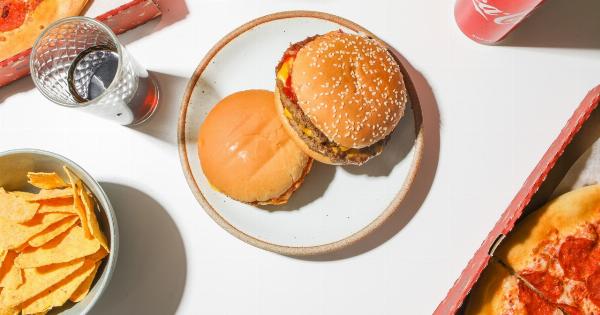Cancer is a devastating disease that affects millions of people worldwide. While there are various factors that can contribute to the development of cancer, including genetics and environmental exposures, diet also plays a significant role.
Certain foods have been linked to an increased risk of cancer and are often referred to as being on the cancer-causing “black list.” In this article, we will explore ten such foods:.
1. Processed Meats
Processed meats, such as hot dogs, sausages, and bacon, have long been associated with an increased risk of cancer.
These meats undergo various processes, including salting, curing, and smoking, which can lead to the formation of harmful compounds like nitrosamines. Nitrosamines are known to be carcinogenic and can increase the risk of colorectal, stomach, and pancreatic cancers.
2. Soda and Sugary Drinks
Soda and other sugary drinks are loaded with refined sugars and artificial sweeteners.
Regular consumption of these drinks can contribute to weight gain and obesity, both of which are significant risk factors for various types of cancer, including breast, colorectal, and pancreatic cancers.
3. French Fries and Chips
French fries and chips are popular snacks and side dishes, but they are not without their health risks.
These foods are typically deep-fried in oil at high temperatures, leading to the formation of acrylamide, a chemical compound that has been classified as a potential carcinogen. Acrylamide is known to cause cancer in animals and may increase the risk of developing ovarian, kidney, and endometrial cancers in humans.
4. Charred and Grilled Meats
While grilled meats can be delicious, the charring and high temperatures involved in the cooking process can produce heterocyclic amines (HCAs) and polycyclic aromatic hydrocarbons (PAHs).
Both HCAs and PAHs have been linked to an increased risk of colon, stomach, and prostate cancers. To reduce the formation of these harmful compounds, marinating meat before grilling and flipping it regularly can be helpful.
5. Artificial Sweeteners
Artificial sweeteners, such as aspartame, saccharin, and sucralose, are commonly found in diet sodas, yogurts, and other low-calorie or sugar-free products.
While they are marketed as a healthier alternative to sugar, some studies suggest that long-term use of these sweeteners may increase the risk of certain cancers, including bladder and brain cancers. However, more research is needed to establish a definitive link.
6. Canned Foods
Canned foods often contain bisphenol A (BPA), a chemical used in the lining of metal cans to prevent corrosion. BPA can leach into the food and disrupt hormone balance in the body, potentially increasing the risk of breast and prostate cancers.
Opting for fresh or frozen foods instead of canned ones can help minimize exposure to BPA.
7. Refined Grains
Refined grains, such as white bread, pasta, and rice, have undergone processing that removes most of their nutrients and fiber. These refined grains are quickly absorbed by the body, leading to spikes in blood sugar levels.
Regular consumption of refined grains has been associated with an increased risk of colorectal and endometrial cancers. Choosing whole grains, such as whole wheat bread and brown rice, is a healthier alternative.
8. Red and Processed Meats
Red meats, including beef, lamb, and pork, have been linked to an increased risk of colorectal and stomach cancers.
Additionally, processed meats, like sausages and deli meats, contain preservatives and additives that may contribute to cancer development. Limiting the consumption of red and processed meats and opting for leaner protein sources, like poultry and fish, can help reduce the risk.
9. Alcohol
Excessive alcohol consumption has been strongly associated with an increased risk of various types of cancer, such as liver, breast, and colorectal cancers.
Alcohol is metabolized into acetaldehyde, a toxic compound that can damage DNA and other cellular structures. Women should limit their alcohol intake to one drink per day, while men should not exceed two drinks per day.
10. Artificial Food Additives
Artificial food additives, such as sodium nitrite, butylated hydroxyanisole (BHA), and butylated hydroxytoluene (BHT), are commonly used in processed foods to enhance flavor, extend shelf life, and prevent spoilage.
Some of these additives have been classified as potential carcinogens and may increase the risk of cancer, particularly in high doses. It is essential to read food labels and avoid products with excessive artificial additives.




























